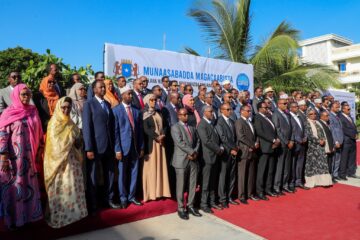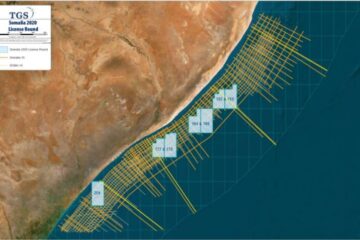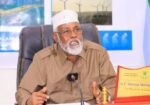How will Somalia benefit from joining the East African Community?

If admitted, Somalia will be the 8th member state of the East African Community
When President Hassan Sheikh Mohamud and his accompanying delegation arrived in Arusha, Tanzania, to attend the 22nd ordinary summit of the East African Community (EAC) in July 2022 as a special guest, his main objective was to renew Somalia’s quest to join the regional bloc.
In his address at the summit, Mohamud asked EAC leaders to fast-track the verification of Somalia’s application to the EAC. “Somalia belongs to East Africa,” he said, adding that Somalia is linked with all EAC members by business, community, and other means.
This is not the first time a Somali president has pushed for Somalia’s admission to the regional bloc. In March 2012, former President Sharif Sheikh Ahmed submitted Somalia’s first application to join the EAC. At the time, the bloc was chaired by former Kenyan President Mwai Kibaki. The move, however, did not materialize. Subsequent applications in 2016 by Mohamud during his first stint as president and in 2019 during the tenure of President Mohamed Abdullahi Mohamed, aka Farmaajo, faced the same fate.
Somalia is now more optimistic about its admission. Mohamud has appointed former Minister of Foreign Affairs and once the Central Bank Governor, Abdusalam Hadliyeh Omer, as Special Presidential Envoy to the EAC to expedite the accession process.
Somalia’s latest push to join the EAC comes following Mohamud’s electoral victory on May 15 which ended more than a year of political crisis due to electoral impasse.
The Democratic Republic of the Congo (DRC)’s admission on May 29 this year, which like Somalia struggles with insecurity, has contributed to Somalia’s optimism to join the bloc. The new Somali leader has promised to promote good ties with the world and fight the Al-Shabaab terrorist organization militarily, economically, and ideologically.
Established in 1999, the EAC was originally comprised of three Partner States – Kenya, Tanzania, and Uganda. That number has more than doubled since with Burundi, Rwanda, South Sudan, and DRC joining.
Following the conclusion of the Arusha summit, the EAC leaders issued a communique directing the body’s Councill of Ministers to fast-track the verification of Somalia’s application to join the bloc. If admitted, Somalia will become the 8th member of the EAC.
So why is Somalia pushing for EAC’s membership? What does it seek to achieve?
Free trade
According to a source close to the Somali president who spoke on condition of anonymity, Somalia’s number one goal in joining the EAC is to boost the country’s economic ties with the region. “Somalia has a strong and active business community in all East African countries, particularly in Kenya, Uganda, South Sudan, Tanzania, and DRC,” he said, noting that joining the bloc will help facilitate stronger trade ties between Somalia and countries of the region.
With an estimated 300 million citizens, the EAC will provide a big market for Somalia’s dynamic business community. The country’s coast, the longest in mainland Africa, and its chain of ports will also act as gateways to landlocked countries of the EAC, which will provide jobs to thousands of Somalis and generate millions of dollars in revenue for Somalia. In addition, it will encourage investment in the country’s infrastructure to upgrade the nation’s roads, airports, and ports to facilitate the movement of goods in and out of the country.
Quizzed on concerns that Somalia’s accession to the EAC will increase its dependency on imports from more industrialized countries within the bloc, the source noted that Somalia already depends heavily on the consumption of imported goods from non-EAC countries and that it will not make a difference to import from EAC countries.
Nonetheless, he sees admission to the EAC as a move that will encourage Somalia to advance its own industries and develop its exportation capacity, in a way that enables the country to access markets in the region.
For Dr. Uweis Ali, a senior economist at Heritage Institute for Policy Studies, the EAC bloc “offers a greater window of opportunity for Somalia for many years to come.” “Of course, if Somalia improves its enabling business environment, it will attract Foreign Direct Investment (FDI) into the country and boost economic activities with its regional partners,” he told Somali Signal.
He added, “If Somalia joins the EAC, it will provide a very good chance for Somali entrepreneurs to explore business opportunities and integrate theirs into regional markets.”
However, Ali pointed to the need for the Somali government “to speed reforms by revitalizing productive sectors and industries, strengthening governance as well as promoting human capital if it is to reap the benefits of joining the bloc.”
Free movement of people
If they join the EAC, Somalis will benefit from free movement within the bloc and will not be required a visa as is the case today in line with the freedoms granted by the EAC’s Common Market, which includes free movement of people. Besides business reasons, many Somalis travel to East African countries such as Kenya and Uganda for education and health among other purposes.
However, long and strict visa policies required by the EAC countries are considered stumbling blocks for Somali citizens. Getting admitted to the EAC will hence facilitate the free movement of Somalis across the bloc. Moreover, the EAC has a network of international airports, which will further connect Somalia to other African countries and the world.
Improve security, good governance
By joining the EAC, Somalia will be under more pressure to improve its security situation and good governance. The bloc underlines the importance of good governance, which includes improved security, as an ingredient for the success of its goal for regional integration. This explains why some member countries like DRC and South Sudan were admitted to the bloc despite poor infrastructure and insecurity – to encourage them to uplift themselves for a safer and more prosperous region.
Somalia’s biggest security threat has been the Al-Shabaab group, which continues to carry out terrorist attacks in the country, killing thousands. The group has also launched attacks in Kenya and Uganda, two EAC member countries. Admitting Somalia to the EAC will thus not only encourage the country to improve its security but will also create a sense of collective responsibility among EAC countries to support efforts to secure Somalia and the region at large.








